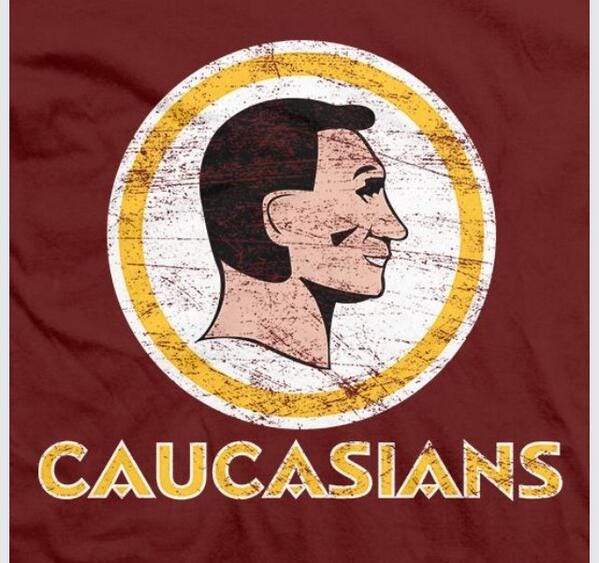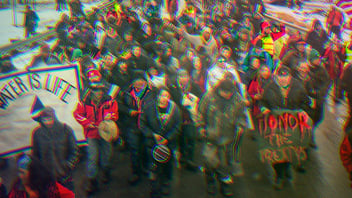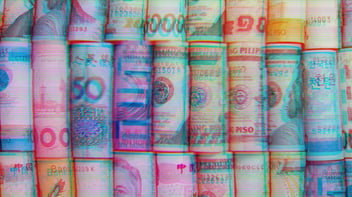Why Are Indian Mascots So Offensive?
 Image Description: Image of a spoof T-shirt, labeled "Caucasions," with side profile of a caucasian man.
Image Description: Image of a spoof T-shirt, labeled "Caucasions," with side profile of a caucasian man.
Hey, SubF*ckers. Welcome to all of our new subscribers. Happy to have you here.
It’s a beautiful Saturday here in New York, and I hope it’s the same wherever you are. I wanted to drop a quick feature that is an epilogue of sorts for our next episode, titled Culture Cancel: The American Holocaust.
Here’s a quick summary of the episode followed by the show’s coda, which talks about the controversy surrounding Indian mascots. I originally had it as part of the episode, but it just didn’t fit, so we decided to isolate it at the end and send it out here. Frankly, it’s been covered exhaustively, and yet I’m constantly amazed by how casually it’s dismissed in conversation to this day as “not a big deal.”
The full episode drops Monday morning, and SubF*ckers will be notified first when it’s available on all platforms. Thanks again for checking in, and for all of the support. Here’s the episode epilogue…
Why are Indian mascots so offensive and racist?
ANSWER: Because Indians exist.
FULL ANSWER: There are no Vikings. No Raiders, Buccaneers or Pirates. And, when they did exist, they were descriptions of groups that participated in damning activities, pillaging and plundering.
Indians are still here.
Relegated to the poorest, furthest reaches of our nation in order to keep them out of sight and out of mind. But they're still here.
Brewers, Giants and Yankees are descriptive terms, not races or ethnicities. Beavers, Tigers and Bears are animals. Less than human. Subhuman.
You don’t see the Irish complaining about the Leprechaun.
Leprechauns aren’t fucking real.
Indians exist. They are human. They are here.
“Brave,” in the context it is displayed, is not a descriptive term; rather, it is ascribed directly through visual brand and identity as a nickname for Indians.
“Redskins” is derogatory. It is a slur. It has always been a slur. Imagine the New York Heebs, Washington Titsoons, Seattle Chinks, Arizona Wetbacks or San Francisco Faggots. That’s why the Redskins name had to go.
Indians are an uncomfortable reminder of our genocidal past. Perhaps had we finished the job and relegated them to the dustbin of history as a people, we could appropriate them more comfortably as mascots.
But they're still here.
Removing a racist name doesn't mean we're losing history or giving in to some leftist conspiracy to erase the past. It's about acknowledging the existence of a people and allowing them to reclaim their heritage in the simplest of ways.
I spent time as a reporter visiting these sovereign nations to understand the 'otherness' of Indian life and what it meant to be sovereign, yet without rights. The struggle to maintain the dignity of heritage in the face of extreme poverty. The Indians I met at Kanatsiohareke, Onondaga, Oneida, Seneca, St. Regis / Akwesasne, Poospatuck, Shinnecock and Cayuga were keenly aware of all of this history. Moreover, they understood that the only thing that held them together as a people after years of rape—both physically and economically—was to hold tightly to their heritage, language, symbolism, traditions, music and humor.
This, I can tell you—some of the funniest and biggest ballbreakers I’ve ever met are Indians.
So, when they see themselves celebrated as mascots on helmets for multi-billion dollar corporations, or even just a high school team, it stings. Now, add the derogatory element of a slur such as "Redskin" to the mix, and it's easy to understand how this cuts even deeper.
Removing these names doesn't erase history. It recognizes the fact that Indians are not just part of history. They are part of the present.
And, hopefully, the future.
Max is a political commentator and essayist who focuses on the intersection of American socioeconomic theory and politics in the modern era. He is the publisher of UNFTR Media and host of the popular Unf*cking the Republic® podcast and YouTube channel. Prior to founding UNFTR, Max spent fifteen years as a publisher and columnist in the alternative newsweekly industry and a decade in terrestrial radio. Max is also a regular contributor to the MeidasTouch Network where he covers the U.S. economy.


